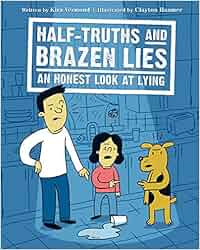Do you
believe in telling the truth? All the
time? Sure you do. But even that’s a lie – because we all lie. (Not only
American politicians….) Whether to protect a friend, to make someone feel
better, or to avoid telling even bigger lies later, lying is central to human
nature.
Guelph’s Norma Fleck award winning author Kira Vermond’s latest book for young readers, Half-Truths and Brazen Lies (Owlkids) is now
available. It answers questions such as:
Why do we lie? Is a lie of omission a true lie? What are the
consequences of lying? Do polygraphs actually work? And when is it okay, or
even a good thing, to lie?
“Deception touches so many parts of our lives without us even realizing
it,” says Kira. “But that’s not always a negative. In some surprising ways,
lies can actually help society run smoother."
From forgeries and hoaxes to plagiarism and placebos, Half-Truths and Brazen Lies illustrated
by Clayton Hanmer, offers historical anecdotes, scientific studies, and
sociocultural analyses to help unpack the complex world of untruths. Told in a
witty, conversational tone with an index and full-colour illustrations, the
book takes a thorough, nuanced approach to a fascinating aspect of human
behaviour.
Author Kira Vermond is an award-winning writer with over 1,500 articles to her name. She has
been a frequent contributor to the Globe
and Mail, Chatelaine, CBC and Today's
Parent and is the author of Why We
Live Where We Live, Growing Up:
Inside and Out, and The Secret Life
of Money: A Kid's Guide to Cash. Kira lives in Guelph, Ontario.
Note: I regularly lead weekly Writing Kid Lit classes and Writing for Children and for Young Adults workshops on Saturday, and often have Kira as a guest speaker. To see details of upcoming Children's Lit classes and workshops, see here (and scroll down). ~ Brian
Kirkus Review of Half-Truths and Brazen Lies
We all lie. We can’t help it.
It is a wide, wide, wide, wide world of fibbery out there. “It’s central
to human nature,” writes Vermond in this intuitively clear survey of the good,
bad, and ugly manifestations of lying. A lie is a falsity with the intent to
deceive. The thing is, and this is the beauty of Vermond’s approach, there
really is no gray area: we know bad lies when we speak them, and there are many
kinds. There are cheating, plagiarism, forgery, and wild exaggeration, but
there are also instances of lying to be kind or polite, or to be outrageous all
in fun, and “most people agree that lying is justified if something terrible
would happen otherwise.” (Yes, sir, Anne Frank is up in the attic.) So,
clearly, not all lies are immoral or unethical, quite the opposite.
Don’t rely on body language or polygraphs to out a lie, both of which
are often mistaken. A society relies on trust, writes Vermond, a generalized
trust, because most people are honest most of the time. Hammer’s
comic-strip–style artwork aptly conveys a kind of agelessness to the
proceedings, making it clear that lying is a timeless phenomenon.
Yes, sometimes lies grease the wheels – “society would collapse if we told the truth all the time,” say some
experts. You wouldn’t want that to happen, so let Vermond be your guide.
You can get a signed copy of Half-Truths and Brazen Lies at the "Writing for Children and for Young Adults" workshop in Guelph on April 30 (see here); it's also available at bookstores, and through Amazon here.
See Brian Henry’s schedule here, including
writing workshops, writing retreats, and creative writing courses
in Algonquin Park, Alton, Barrie, Bracebridge, Brampton, Burlington, Caledon,
Collingwood, Georgetown, Guelph, Hamilton, Ingersoll, Kingston, Kitchener,
London, Midland, Mississauga, Newmarket, Orillia, Oakville, Ottawa,
Peterborough, St. Catharines, St. John, NB, Sudbury, Thessalon, Toronto,
Windsor, Halton, Ingersoll, Kitchener-Waterloo, Muskoka, Peel, Simcoe, York,
the GTA, Ontario and beyond.


No comments:
Post a Comment
Note: Only a member of this blog may post a comment.